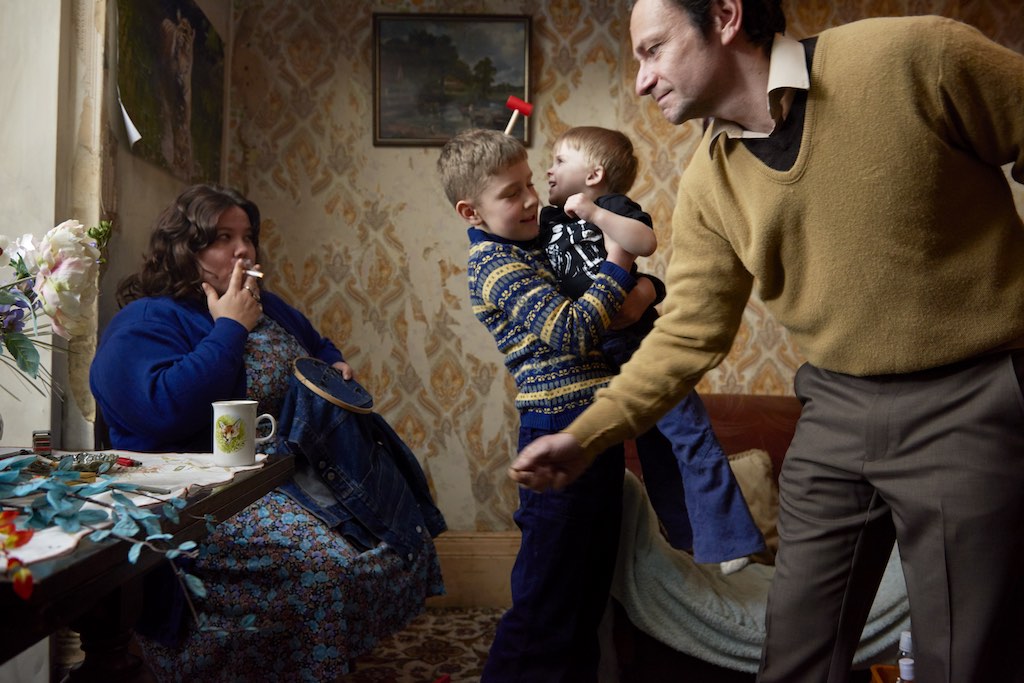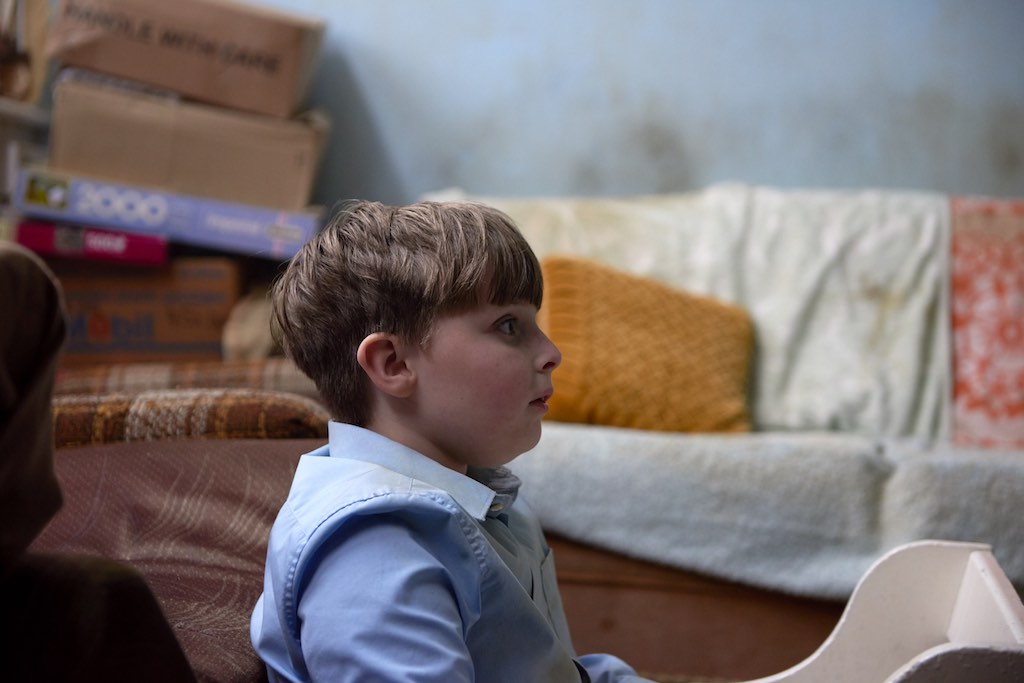Ray’s world has shrunk to a single room in a council flat. His life consists of drinking home-brew, smoking, gazing out of the window, listening to Radio 4 and sinking into an alcohol-induced stupour. There’s no need ever to leave his bedroom because his neighbour Sid does all the necessaries.
A lone alcoholic asleep in a dingy room may not be the most gripping opening to a new British film Ray & Liz, but the scene is shot with such compelling attention to detail that a kind of squalid dignity is conferred on Ray’s solitary existence. The drama comes later when his estranged wife Liz drops by to cadge some money off him. “Pissed again, you drunken fuckin’ bastard,” she yells at Ray as he falls out of bed and lies in a heap on the floor. “Up on your feet, if you can.” When she goes on to berate him about wasting his life, though, Ray is surprisingly defiant: “As long as Sid cashes my dole down that post office, pays my bills and brings me special home-brew, I’m happy as a pig in shit,” he insists.
And therein lies the strength of Richard Billingham’s debut feature. The lives he portrays may be hopeless, but the protagonists never indulge in self-pity and each scene is recorded with a gentle, fly-on-the-wall detachment that avoids the voyeuristic sentimentality that so often characterises “gritty”, working-class dramas. Scenes of the solitary Ray (Patrick Romer) and visiting Liz (Deidre Kelly) bracket flash-backs of their previous life together.
The casting of the earlier scenes (pictured below: Justin Salinger as Ray, Ella Smith as Liz and Jacob Tuton as Richard) is so perfect that watching Ray & Liz is like seeing the photographs come to life that Billingham took in the 1990s of his dysfunctional family. Ray’s A Laugh – exquisitely observed photographs of his alcoholic father, obese mother and disturbed younger brother – made Billingham’s name as an artist. They were included in Sensation, the Royal Academy exhibition of Young British Artists in the Saatchi collection and, in 2001, earned Billingham a nomination for the Turner Prize. He has wanted to make the film ever since, but translating stills into a film could be fraught with difficulty. It's one thing to recreate the clutter of the cramped family home, in which every surface is covered in pattern or crammed with ornaments, and quite another to capture the emotional void that this visual frenzy seeks to hide. In the intervening years, though, his memory of the way people looked, sounded and moved 20 years ago hasn’t dimmed while any lingering disappointment, rancour or blame conjured by childhood memories has evaporated. You don’t have to know the photographs to relish this surprisingly moving film, since the story is told, without judgement, from the perspective of an insider recalling every detail of the unfolding scene.
He has wanted to make the film ever since, but translating stills into a film could be fraught with difficulty. It's one thing to recreate the clutter of the cramped family home, in which every surface is covered in pattern or crammed with ornaments, and quite another to capture the emotional void that this visual frenzy seeks to hide. In the intervening years, though, his memory of the way people looked, sounded and moved 20 years ago hasn’t dimmed while any lingering disappointment, rancour or blame conjured by childhood memories has evaporated. You don’t have to know the photographs to relish this surprisingly moving film, since the story is told, without judgement, from the perspective of an insider recalling every detail of the unfolding scene.
And there’s comedy as well as violence and depression. Liz has spent Ray’s redundancy money on the crateful of booze hidden in the cellar. Ray’s simpleton brother-in-law, Lol (disarmingly played by Tony Way) has come to look after three-year-old Jason while the others go shopping. But when Will the lodger (Sam Gittins) returns home and decides to cause mischief, things unravel with tragicomic predictability. The family returns to find the drink gone, Lol comatose on the sofa and Jason prancing round like a banshee brandishing a carving knife. Liz’s revenge is the only time we see her aroused to action; otherwise, she doesn’t lift a finger except to smoke, drink tea or do embroidery and jigsaw puzzles. She and Ray spend half the day sleeping, leaving the boys to fend for themselves.
The next time we see Jason he is nine and bunking off school to go to the zoo. Animals constantly appear in the film; whether it’s the budgies and jerbils busying themselves in small cages, the dog pissing on the carpet, the rabbit whose droppings litter the sofa or the snails Jason keeps in a box under his bed, the constrained lives of these pets offer bleak echoes of the family’s restricted circumstances. Jason (Joshua Millard-Lloyd, pictured above) goes to a friend’s firework party, but he can’t remember the way home and spends the night in a shed where he nearly dies of hypothermia. The school and social services soon get involved and he is taken into care. When told the news, Liz sheds a brief tear and reaches for a ciggy, but Ray seems more concerned about the £25 that will be docked from their dole money.
Jason (Joshua Millard-Lloyd, pictured above) goes to a friend’s firework party, but he can’t remember the way home and spends the night in a shed where he nearly dies of hypothermia. The school and social services soon get involved and he is taken into care. When told the news, Liz sheds a brief tear and reaches for a ciggy, but Ray seems more concerned about the £25 that will be docked from their dole money.
But Ray & Liz is less an indictment of incompetent parents than a sympathetic meditation on the effects of poverty and lack of opportunity told from the perspective of the one who managed to escape through education. Billingham looks back with understanding, rather than anger, at the people he left behind.















Add comment